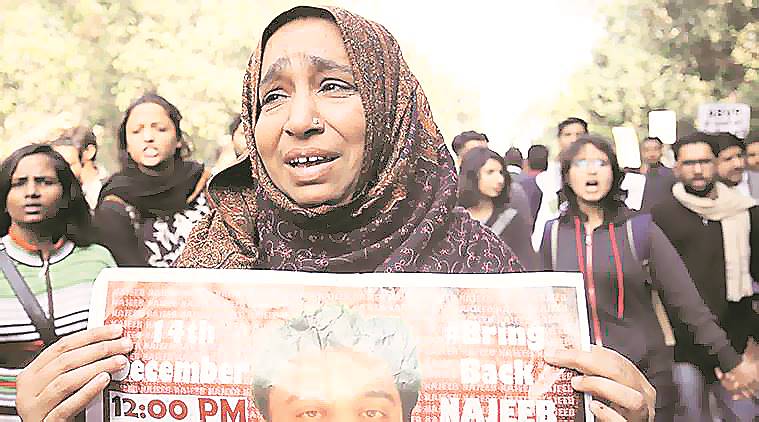 Najeeb’s mother Fatima
Najeeb’s mother Fatima
The CBI Friday informed the Delhi High Court that the disappearance of JNU student Najeeb Ahmad, missing for a year-and-a-half, was only a “missing” person case at the moment, since it has “not found any evidence” to show that a crime was committed.
The agency, which took over the case on May 16 last year, also told a bench of Justice S Muralidhar and Justice I S Mehta that currently, it does not have “an iota of evidence” to arrest or take any coercive action against the nine students who are suspects in the disappearance. Ahmad had gone missing on October 15, 2016, following a scuffle the previous night with some students allegedly affiliated with the ABVP.
Najeeb’s mother Fatima Nafees had moved the court on November 25, 2017, seeking directions to the government and police to trace him. As Delhi Police remained clueless about his whereabouts, the probe was handed over to the CBI on May 16 last year.
Giving details about the status of the probe, the agency Friday said that on analysis of data retrieved by the Central Forensic Science Laboratory in Chandigarh from six of the nine mobile phones of the suspects, it has “not been able to find anything remotely connected to the allegations against them”. “We are not even sure if a crime has been committed,” the CBI lawyer told the court.
Senior advocate Colin Gonsalves, appearing for Ahmad’s mother, asked the court to peruse the statements of suspects recorded by CBI to ascertain whether the agency questioned them about their movements after Ahmad’s disappeared and compared their answers against mobile phone location data.
In response, the agency said it has done much more than questioning the suspects about their movements and comparing it to their mobile phone location data. The bench observed that the agency appeared to be making efforts to trace the missing student, and should not be pressured at this stage. The matter will be heard on July 12.